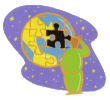
Legislative/Action
Letter
to Hartung
 |
Legislative/Action |
| Welcome
|
Senator
Tom Hartung, Chair Dear
Senator Tom Hartung and Committee, We
are a subgroup of the four county (Linn, Benton, Lincoln, & Coos)
Parent Autism Support Group comprised of professionals, lawmakers, and
families whose children have Autism Spectrum Disorders (A.S.D.). For many years we have been concerned about the lack of education
and services adults and children with Autism are receiving in Oregon.
Since 1995, we have been actively involved working to improve the quality
of life for the estimated 8,000 people with A.S.D.
in our state. We
are thankful to the Governor and the Legislative Body for recognizing
some of the issues people with A.S.D. experience.
Passing Senate Bill 765, which required a task force be created
to study in greater detail these issues which people with A.S.D. face,
was an important step toward greater Autism awareness.
We appreciate the time and effort the Task Force put forth in
examining issues such as education, Early Intervention, and the need
for training and information on Autism Spectrum Disorders. We
agree with the Task Force's assessment that early intervention is a
critical key toward ensuring that people with A.S.D. have a successful
future. Children as young
as 18 months can now be identified and diagnosed.
The state must fund services for preschool children (18 months
– 5 years old). Research
shows that early, intensive and appropriate education can greatly alter
the quality of life and outcomes for many people with Autism. We
are pleased the Task Force recommends the term Autism Spectrum Disorders
be used instead of simply Autism.
However, we remain concerned the federal definition of Autism
under the Individuals with Disabilities Education Act (I.D.E.A.) was
not stated in the Final Report.
Furthermore, we noticed that the controversy between a medical
diagnosis vs. an educational diagnosis of Autism was not abolished.
This distinction is not made in other states.
In fact, if a team of medical Autism experts have determined
a child has an Autism Spectrum Disorder, in other U.S. states that qualifies
the child for Special Education and thus an Individualized Educational
Plan (I.E.P.). We
believe that creating a state Autism Information & Training Center
as well as establishing local Regional Autism Centers throughout the
state is a good idea. We
are willing and eager to work with the Task Force to develop the details
of what this might look like and how funding might be obtained. Oregon
has been a leader in this nation for innovative programs like the Bottle/Recycle
Bill. This is an opportunity for Oregon to become known for creating
excellent programs meeting the unique needs of people with Autism Spectrum
Disorders. We
would like to see the state and local Autism Centers form a collaborative
partnership including families and medical, legal, education, and social
service agencies. We propose
a model which can bring the very best and provide the Autism expertise
that is badly needed in our state to determine eligibility, implement
I.E.P.s, and provide information and services.
This collaborative effort would provide current, accurate, and
child-focused information & training on the issues which pertain
to Autism. Who can best
determine if a child has an Autism Spectrum Disorder- the experts in
Autism or educators who have little or no training and credentials in
Autism? These key crucial
decisions of diagnosis and eligibility must be made with input from
those who have Autism expertise.
We also believe that involving Autism experts would lead to a
reduction of the number of families seeking litigation as a way of solving
the problems their children face.
Important
aspects not included in the Task Force’s Final Report are:
We
strongly urge the Legislative Body to adhere with the goal as stated
in pg. 1 of the Autism Task Force’s Final Report- "the child is
the center". We hope
you will go one step further and adopt, publicly state, and commit (as
mandated in the re-authorization of I.D.E.A. of 1997) that parents are
the experts on their disabled child and are a valuable resource.
This will go a long way towards healing the frustration and mistrust
which has developed over the years between families whose children are
disabled and the educational system in Oregon. We
are ready to work with you in any way we can to change Oregon's education
and service delivery system so that Oregon will become a better place
for people with A.S.D. Please
let us know how we can assist you with the implementation of these necessary
changes. Thank you. Sincerely
Yours, Corvallis PDD/Autism Support Group (signed by 8 families & professionals) Internet: http://members.home.nethttp://www.teleport.com/~aso/corvallis//
|
|
Inclusion of information about Autism organizations, providers, publications, services, programs and products on our web site does NOT constitute any agreement, sponsorship, endorsement or warranty of any kind by the Corvallis Autism Support Group. We offer this information as a helpful resource tool to families and professionals. |